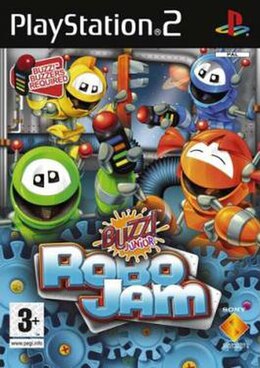Buzz! Junior: Robo Jam
| Buzz! Junior Robo Jam | |
|---|---|
 | |
| Developer(s) | Magenta Software and FreeStyleGames |
| Publisher(s) | SCEE |
| Platform(s) | PlayStation 2, PlayStation 3 (PlayStation Network) |
| Release | PlayStation 2 PlayStation Network |
| Genre(s) | Party |
| Mode(s) | Single player, Multiplayer |
Buzz! Junior: Robo Jam is a 2007 family game for the Sony PlayStation 2, and is the second game in the Buzz! Junior series of games. Robo Jam was co-developed by Magenta Software and FreeStyleGames. Magenta supplied the engine and nineteen of the twenty five mini-games while Freestyle supplied the remaining six mini-games. The game was also released for PlayStation 3 on 14th May 2009 as a download from the PlayStation Store, and includes trophy support.
Buzz! Junior: Robo Jam won the 2007 children's jury Giga Maus award.[1]
Gameplay
Gameplay is based around multiple mini-games, each quite simple and straightforward to play using the four Buzz! controllers. It's primarily aimed at the family market but offers appealing entertainment to almost anyone of any age. Simple game play allows young children to participate while still being entertaining enough for older children and adults. The game is similar in concept to Jungle Party, with robot based mini-games in a space-themed environment. One of the main differences between Jungle Party and Robo Jam is the introduction of AI, allowing players to play against the computer. Unlike Jungle Party there is no solo game mode. A full game can be played with only one human player and three computer players.
Games
- Astro Blaster
- Barrel Bashing
- Basket Eye-Ball
- Bug Blast
- Cosmic Keepers
- Crash Test Dummies
- Crazy Conveyer
- Crazy Cook
- Galaxy Grab
- Go Nut
- High Dive
- Mad Mallets
- Nirto Racing
- Octo-Beat
- Odd Bot Out
- Pillow Fight
- Piston Peril
- Plummeting Platforms
- Pop Up Pairs
- Robo-Rollers
- Robot Teleport
- Robot Throwing
- Rocket Robots
- Saucer Shootout
- Space Jumping
References
- ^ "Giga Maus Awards 2007". 2007-10-10. Retrieved 2007-12-10.
{{cite web}}: Check date values in:|date=(help); Cite has empty unknown parameter:|coauthors=(help)
